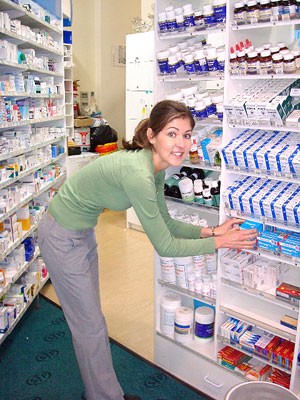Larry and Janet McKee always encouraged their children to follow their dreams, and to never quit.
It is a lesson their daughter Megan McKee, a graduating pharmacy student, still takes to heart two decades later.
The advancement of pharmacy begins with the development of willing and able leaders to take the field to new heights. There is no way to bring pharmacy to the next level without such leaders, McKee said.
“”My goal has been to foster student leaders,”” she said. “”I want to push the world of pharmacy forward.””
The formula is simple. If students are leaders in school, they will continue after graduation and into their future professions, something pharmacy desperately needs, McKee said.
The goal is easier said than done.
The lack of communication between the individual health care fields is a serious cause for concern, because patients’ lives are often literally in the hands of these professionals, she said.
Fed up with these obstacles, McKee sought for a way to alleviate the health care communication problems rather than waiting for someone else to step up, she said.
“”I’m always excited to start something,”” she said.
McKee found it “”bizarre”” that health care professionals from different fields did not consult each other more, so she organized a pilot program examining the issue.
She used students from the College of Pharmacy, College of Medicine, College of Nursing and College of Public Health to take part in a case study. The project forced individuals from different health care backgrounds to work together, each college lending its own strength and expertise, McKee said.
Pharmacy students focused on medicinal drug possibilities while medical students showed strength in diagnosing. Nursing students saw the personal side of a patient’s troubles and public health students examined the case’s possible public influence on society, she said.
The program was a significant breakthrough in the way health care professionals looked at their own work methods and interprofessional communication.
Following McKee’s study, the UA began implementing curriculum to create teamwork experiences between the four health care colleges, McKee said.
Developing a successful pilot program is not McKee’s only major achievement. In her four years at the university, McKee amassed several significant awards, including the American Pharmacist
Association-Academy of Student Pharmacists Professionalism Award and the UA Foundation Outstanding Senior Award, said Ginny Geib, communications director for the College of Pharmacy.
“”Both of these were earned by her extraordinary participation in professional activities through several student organizations at the college,”” Geib said.
Besides attaining a 3.76 grade point average, McKee received several scholarships from various health organizations.
It is McKee’s own motivation to excel in all of her scholastic endeavors that has given the UA one more graduate willing to lead the way into the world, said Theodore Tong, associate dean of academic and student affairs for the College of Pharmacy.
“”Megan is unequivocally dedicated to and passionate about achieving excellence in all efforts that she undertakes,”” he said.
After graduation, McKee will move on to a residency program at the University of Texas Health Systems Hospital in San Antonio.
She will use her UA-learned skills to bring her post-graduate learning experience to the next level while never losing sight of her ultimate goal, reflecting the ideal McKee’s parents first instilled in her during her childhood, she said.
“”In a way, it’s a pat on the back. If anything, it’s encouraging me to work harder,”” she said of her numerous awards. “”My work isn’t over.””









